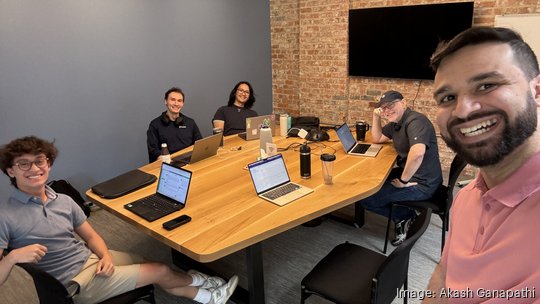
Armed with an idea and a LinkedIn post, a trio of technology vets secured nearly $2 million to fund their startup before they even had an actual product.
Meet Opine, a stealthy Durham startup looking to use AI to streamline technical pre-sales. Today, they have four customers, including JupiterOne, the cybersecurity firm they left last year.
But when they were assembling the capital to create a company, all they had was a pain point.
The leap
The leap happened last year. A trio of former JupiterOne employees took the entrepreneurship plunge, quitting their jobs and going all in on an idea: Akash Ganapathi, Charlie Duong and Austin Kelleher.
Duong and Kellher were employees two and three at JupiterOne, there since before it spun out of LifeOmic in 2018. Ganapathi was recruited as employee number 18, one of the first hired after JupiterOne’s Series A round.
All three had an “all-in” approach, Ganapathi said. It wasn’t uncommon to see them working on the weekends. They believed in the “mission” that much — so much so that when talk began of starting a company, they didn’t write a single line of code until they had quit JupiterOne.
“JupiterOne demanded our full attention,” Ganapathi said.
When they left the Research Triangle Park company, they didn’t have an actual product for their new startup. It was a risk that required conversations, and not just with JupiterOne CEO Erkang Zheng (who gave the trio their full support and continues to advise them), but with their families. Ganapathi and his wife had a baby on the way, and the decision to bet their savings on an unproven venture wasn’t taken lightly.
The idea came out of Ganapathi’s role at JupiterOne, as senior director of product management. To sell a new product to established players required an intense amount of technical expertise. Add in busy work such as filling out deal summaries and typing up stakeholder emails, and it’s a lot outside the meat of the role – selling. Salespeople with technical experience are expensive. And their time was being wasted on administrative tasks.
Ganapathi remembers having a beer at Bottles & Cans when the idea struck. What if the process could be completely automated through an “AI agent” of sorts?
“Sell more, repeat less,” he summarized.
The idea was enticing, so much so that, when it ultimately became a company, JupiterOne would be its first customer.
But it was tough going. The co-founders didn’t receive a paycheck from their new entity for nearly six months. The product itself wasn’t released until after the firm closed its initial round of capital, nearly $1.9 million, earlier this year.
And that was unusual, as it came almost entirely from inbound sources.
The post
Scot Wingo, co-founder of Triangle Tweener Fund, said he reached out with a cold email after hearing “rumblings” that they were working on something.
“I met the founders and committed right there,” he said. “They did the [LinkedIn] post and they were off to the races.”
It was that LinkedIn post, announcing their move from JupiteOne to a startup last year, that would prove critical in attracting capital.
“Over 75 percent of the round was filled by people who came to us after seeing the LinkedIn post about what we were working on,” Ganapathi said.
Local investors did buy in. Primordial Ventures also wrote a check. But local dollars amounted to less than 25 percent of the raise. Primarily, backers came from the Bay Area.
Today, the firm is starting to show traction, Ganapathi said, having hired its first non-founder employee — with another job posted, in engineering.
But the real work is just beginning. On its current trajectory, the firm has enough runway to keep going through 2026. The plan is to raise again in 2025 to keep up customer traction.
Ganapathi said what keeps him up at night is making sure to optimize spending.
“It’s should we be spending on this hire or that hire?” he said. “We have a limited number of people we can hire before we hit the next milestone. … There’s a lot of ways to play it”
What's next
The odds are typically stacked against a startup, particularly a company trying to do something new. But investors are optimistic that they’ve picked a winner. Wingo points to the fact that the firm has modified its idea as it’s gone through the research phase.
“They have really good instincts,” he said.
But there are challenges, as enterprise SaaS sales is getting harder.
“It’s increasingly important to make sure the customer sees the value of your solution as quickly as possible,” Wingo said. In the “olden days,” you could promise an eight-month payback period.
“That kind of needs to be eight days now,” he said.
Success will be the company getting data from its first customers that shows a higher, quicker win rate, he said.
It’s not Ganapathi’s first foray into startups. He quit UNC-Chapel Hill to cofound Trill A.I. with a group of high school friends from the North Carolina School of Science & Math. The firm, founded in 2014, aimed to use artificial intelligence to give asset managers a competitive edge and raised about $3 million before folding during the pandemic. Ganapathi said the experience was basically a crash course in entrepreneurship that taught him lessons he uses at Opine.